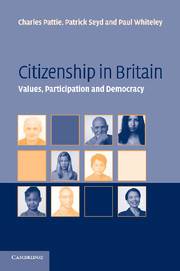1 - What is Citizenship?
Published online by Cambridge University Press: 22 September 2009
Summary
Introduction
This book is about citizenship in contemporary Britain. It addresses the question: ‘what does it mean to be a British citizen in the early part of the twenty-first century?’ Answering this question leads to a number of subsidiary questions like ‘what does it mean to say that someone is a good citizen?’; ‘what determines the values and behaviours which constitute citizenship?’; and ‘what does citizenship mean for the wider society and the effectiveness of the political system?’
Important changes are taking place in Britain in the relationship between the citizen and the state. The meaning of citizenship, the relationship between citizens and government and problems of representation and accountability in the modern state have all become the focus of research in recent years (Andrews, 1995; Brubaker, 1992; Etzioni, 1995; Spinner, 1994; van Gunsteren, 1998). In Britain there are general questions to be asked about the effectiveness of democracy and the role of the citizen in government in the twenty-first century (Parry, Moyser and Day, 1992; Beetham, 1994). Similarly, there are changing conceptions about the role of citizenship in promoting effective policy-making and the effects of a strong civic tradition on the performance of the political system as a whole (Putnam, 1993; Van Deth et al., 1999; Weir and Beetham, 1999).
Against this background there are increasing concerns about changes in society which are undermining the effectiveness of democracy and weakening traditional conceptions of citizenship.
- Type
- Chapter
- Information
- Citizenship in BritainValues, Participation and Democracy, pp. 1 - 26Publisher: Cambridge University PressPrint publication year: 2004



